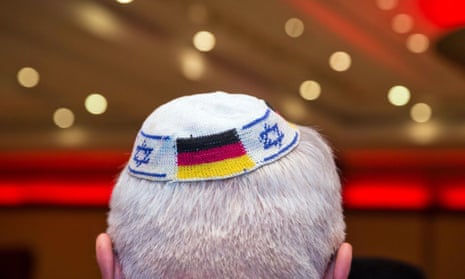Germany’s government commissioner on antisemitism has suggested Jews should not always wear the traditional kippah cap in public, in the wake of a spike in anti-Jewish attacks.
“I cannot advise Jews to wear the kippah everywhere, all the time, in Germany,” Felix Klein said in an interview published Saturday by the Funke regional press group. The remarks were criticised by the Israeli president as representing a “capitulation” to antisemitism.
In issuing the warning, Klein said he had “alas, changed my mind compared to previously”.
Antisemitic attacks are on the rise in a number of European countries, and a survey of Jewish people across the European Union carried out in December found 89% of Jews feel antisemitism has increased in their country over the past decade, while 85% believed it to be a serious problem.
Antisemitic hate crimes rose by 20% in Germany last year, according to interior ministry data, which blamed nine out of ten cases on the extreme right. There were 62 violent antisemitic attacks, compared to 37 in 2017. France has also seen a spike in violent incidents.
Klein, whose post was created last year, cited “the lifting of inhibitions and the uncouthness which is on the rise in society” as factors behind a rising incidence of antisemitism.
“The internet and social media have largely contributed to this, but so have constant attacks against our culture of remembrance.”
And he suggested police, teachers and lawyers should be better trained to recognise what constitutes “clearly defined” unacceptable behaviour and “what is authorised and what is not”.
Israeli President Reuven Rivlin said on Sunday that Klein’s remarks “shocked” him, and while appreciating the German government’s “commitment to the Jewish community,” accused it of bowing to those targeting Jews.
“Fears about the security of German Jews are a capitulation to antisemitism and an admittance that, again, Jews are not safe on German soil,” said Rivlin. “We will never submit, will never lower our gaze and will never react to antisemitism with defeatism - and expect and demand our allies act in the same way.”
The US ambassador to Germany, Richard Grenell, also criticised Klein’s advice. He wrote on Twitter: “The opposite is true. Wear your kippa. Wear your friend’s kippa. Borrow a kippa and wear it for our Jewish neighbors. Educate people that we are a diverse society.”
The president of the Central Council of Jews in Germany welcomed the fact that government had recognised the seriousness of the situation. “It has for some time been the case that Jews in some cities potentially endanger themselves if they are visible as Jews”, Josef Schuster told news agency AFP.
The increased prominence of far-right parties in a number of European countries in the past few years has led to antisemitic and other extremist rhetoric that was previously confined to the fringes appearing more and more in the mainstream. In Germany, the arrival in parliament of the far-right AfD, whose leaders openly question the culture of atonement for second world war atrocities, has contributed to the change in atmosphere.
In Hungary, the nationalist government of Viktor Orbán has repeatedly been accused of anti-semitism, particularly in its campaigns against the financier and philanthropist George Soros, who is of Hungarian Jewish origin. Orbán has always denied the allegations and pointed out that, on the whole, Jews living in Hungary feel safe, unlike many living in western Europe. He has also criticised western Europe for accepting refugees and migrants from Muslim countries, claiming they bring antisemitism with them.
Klein acknowledged that the arrival of more than a million asylum seekers, many from Muslim countries such as Syria, Afghanistan or Iraq, has had an impact on the situation in Germany. Some were influenced by watching certain television channels “which transmit a dreadful image of Israel and Jews”, he said.
However, he emphasised that the far-right was to blame for the overwhelming majority of antisemitic crime.
“Antisemitism has always been here. But I think that recently, it has again become louder, more aggressive and flagrant,” Berlin’s top legal expert on antisemitism Claudia Vanoni said in a recent interview, adding the problem was “deeply rooted” in German society.
She also said the proliferation of online platforms that allow people to express extremist views without inhibition while hiding behind screens had fostered the rise in cases.
Justice minister Katarina Barley told the Handelsblatt newspaper the increase was “shameful for our country” but added that the police were “vigilant”.
Sabine Leutheuser-Scharrenberger, a former justice minister, said: “Everything has to be done to ensure that Jews can live their religion without facing danger and while relying on the rule of law”.









